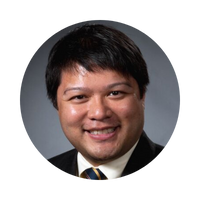
"Diversity enhances our lives. However, barriers still exist which prevent us from enjoying the maximum benefit that diversity can bring. My experiences as an out, queer, first-generation, naturalized Filipino-American have enabled me to work closely with diverse populations, including immigrants, communities of color, LGBTQIA, and the incarcerated, in many settings. I’ve often felt that the different aspects of my identify were not represented in academia, professional organizations or my chosen field of clinical immunology.
H owever, when I joined CIS as a fellow in training, I was impressed by the fact that I saw others who shared various aspects of my identity at all levels of membership and leadership. I am fortunate that I have found diverse mentors and colleagues at CIS who celebrate and encourage diversity, and these experiences have helped me pay it forward to the next generation of clinical immunologists.
owever, when I joined CIS as a fellow in training, I was impressed by the fact that I saw others who shared various aspects of my identity at all levels of membership and leadership. I am fortunate that I have found diverse mentors and colleagues at CIS who celebrate and encourage diversity, and these experiences have helped me pay it forward to the next generation of clinical immunologists.
As co-chair of the Diversity & Inclusion Committee, I am keenly aware of the continuing need to recruit, mentor, and encourage medical providers and scientists who are members of under-represented and marginalized communities, to remain in the field of medicine and biomedical research, including but not limited to clinical immunology. The CIS has made important inroads in addressing this talent gap by actively recruiting diverse participants in all aspects of its programming, by purposefully inviting speakers with varied backgrounds, and developing programs to address the needs of the diverse patient and constituent populations we serve.
Building a diverse CIS community will enable us to develop mutually respectful, culturally-competent relationships with our patients, research subjects, and their families, thereby facilitating high quality, compassionate care and research. We must all continue to work together to achieve these ideals in order to address the ongoing disparities in health and society at large."